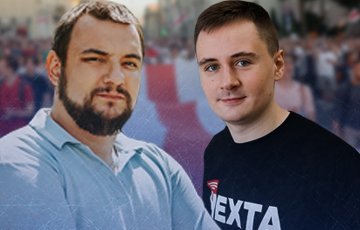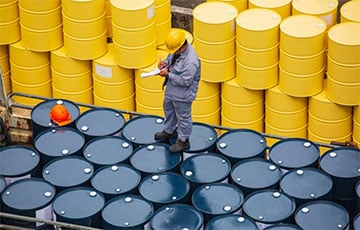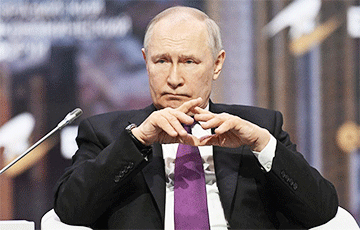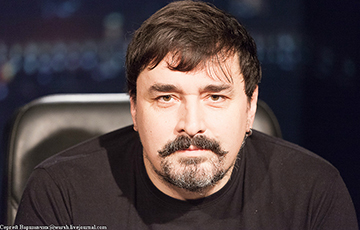Sergey Dylevsky Answers NEXTA’s Questions of Strike
13- 28.10.2021, 14:05
- 16,858

The most important thing today is to save people from covid.
is the leader of the Belarusian Union of Workers, formerly a worker at the Minsk tractor plant. In August 2020, he drove injured protesters to hospitals, later headed the strike at the MTZ. He served 26 days behind bars. On 13 October, as the last member of the Coordinating Council at large in Belarus, he left the country. On August 30, he issued an ultimatum to the Lukashenka regime and announced the pre-strike state.
The labour leader answered questions of NEXTA channel chief Stepan Putila.
- Hi, Sergey. The day before, the Belarusian Union of Workers announced the start of a nationwide strike from 1 November. Why November 1?
- It is very simple. The first and most important question is how long can we wait? If the Belarusians are not ready to strike today, they will never be ready. Plus, the epidemiological situation in the country. It's a disaster, people are dying en masse. Hundreds of people die every day; state statistics lie. Every day, we see on social networks how people take pictures of these pits dug by tractors in cemeteries. This is not a cemetery of Minsk but somewhere near Soligorsk or Stolbtsy. When there are 20 or 30 pits for such a small town, dug daily to bury people, and tomorrow they will dig the same ones, it means that our people are dying like flies.
The government does nothing to solve this problem. The news says all references to the need to observe any epidemiological norms, protect oneself, wear masks, use antiseptics and so on have been removed from public transport and state institutions. Any mention of the coronavirus is being hushed up by the authorities. We realize the epidemiological situation will worsen even more because of it.
Plus, hatred of Lukashenka. People are exhausted. People are tired of working for kopecks. People are tired of the working conditions they face, of the constant detentions. Every Belarusian family has faced either detention or arrest, or imprisonment of relatives. Something should be done about it. We have 824 political prisoners, only recognized ones. More than 4 thousand criminal cases have been initiated under protest articles. All these people can potentially become prisoners.
- It is a kind of social responsibility to people in these terrible conditions and coronavirus?
- Of course. First and foremost, it's the responsibility for themselves and their families. A man who goes to work today risks health. One will bring an infection home from work and infect his spouse, his child. Or his wife will come home from work and infect her spouse. This epidemic will not stop until people die out.
- You keep in touch with many workers. How's the situation at plants now, including the coronavirus situation? We've had reports almost half of the people in workshops at some plants are already sick. What is the reality?
- In reality, the situation is even worse than we see in social media. People are often afraid to speak openly about the problems at their enterprises. However, we know the facts when some 200-250 of 700 employees are on sick leave at home or are hospitalized with coronavirus. It is a third of the entire workforce.
- Another 100-150 people go on strike, and the shop will stall?
- Yes. If half of the shop is not at work, the shop will stall. He won't be physically able to cope with the plan and the work. A person is physically incapable if we mean mechanical engineering, of maintaining three machines. And if we mean that people, to raise money somehow, have to operate two or three machines at a time, that is, exhausting. If a person, who won't go to work and goes into self-isolation or, God forbid, has coronavirus and stays at home, then another person has to operate five machines at once. It's impossible. And the next processing operation will not get the part. A chain reaction will cause the shutdown of the workshop, and subsequently the enterprise as well.
- Given the sanctions, let me remind you, there will soon be no parts. And the massive job cuts we have been talking about lately and writing about on the telegram channels will affect the enterprise. What do you think?
- I agree. I am certain of it. The sanctions are already affecting a very large number of businesses. Many companies, which used to cooperate with Belarusian enterprises, have already stopped their cooperation preventively, not waiting for sanctions in order not to fall under secondary sanctions. There is already an acute shortage of parts and equipment supplied from abroad.
In this regard, there are already big problems. If people do not go to work, go into quarantine and self-isolation, it will lead to a complete standstill of the enterprise.
- Given the situation in the regions. Buses are already being cancelled there because there is no one to work. People are sick, plus many do not want to work for such money. I think if at least more people stay home, many businesses will also suspend operations. What do you think of the regions?
- It's the same picture as throughout Belarus.
- It's much worse there than in Minsk. That is the point.
- In Slutsk, I think, buses have been cancelled because the drivers of these buses have either quit their jobs because they don't want to work for a pittance or are sick with coronavirus. Meanwhile, all mentions of coronavirus, restrictions, the mask regime and so on are being removed from these buses. It's absurd.
- I guess this is being done so that this epidemic, which the dictator wants to ignore, does not make people think that they need to stay at home, keep themselves and their loved ones healthy.
- At the moment, a total genocide of our population is being carried out in the territory of the Republic of Belarus by the so-called leadership of our country. In other words, due to such maniacal intentions, they simply are carrying out genocide of the population.
- The announcement of the strike was like a hammer on the head to some people. And many were surprised, some laughed. As far as I am concerned, a strike is not what people understand: the country comes to an abrupt halt and nothing works except for a couple of medics. It's not like that. As far as I understand, it will escalate in an avalanche: one shop, one enterprise, then several. How do you see it?
- Yes. That's exactly how we planned it. We did not expect the strike to repeat itself as it had happened in Soligorsk, Zhodino at BelAZ, Minsk at our plant when 5-10 thousand people walked out in one day. Last year, the strike started with 10-20 people, who led hundreds and thousands of people to go on strike. The situation here is the same. We do not expect a huge number of people to decide to save their lives and health, protest the regime on the first day.
I am sure we will be observing a pattern where the strike is an avalanche. The strike movement will increase day by day.
- That is, to watch, inspire others and make a decision.
- Yes.
- How was the work with workers carried out? What percentage could you reach particular enterprises and what kind of feedback did you receive? What did they tell you?
- Look, we didn't aim to gather crowds. From the beginning, we cooperated with the activists. The activists do not mean thousands of people. Ten people may represent an active part of the enterprise, at some moments there may be one or two people. But they broadcasted the mood directly to the plants and enterprises. All the work was done through them: propaganda campaign, printed materials, conversations, persuasion.
There is a huge number of people who agree that the country needs changes, but they doubt whether it is safe. And what to do next? Do I have enough financial means to do it? We have been working through all these points. We will keep saying that a strike is always a risk. When I announce a strike, I understand it is also a reputational risk for me, and to some extent a risk to my security, because we know how the security services work. But I am willing to take that risk.
Those who have joined us are ready for risk to a lesser extent. At the moment, we believe that a strike in the form of "just stay home" is the safest option. The reason is that a person will not be detained for mass action or agitation at the workplace. When a person doesn't appear at work, the maximum risk is being dismissed from a boring job for which they are paid pennies. In some cases, a person gets 65 kopecks for a month given all deductions. But it is still a risk. During the six months of the work of the Belarusian Association of Workers, we explained all the risks to mitigate them as much as possible.
A person may not have enough financial support to go on strike. Our task is to support this person. Once again, we do not have the task to buy a strike, as it happened in some cases last year. I see that in some cases the strike was simply bought, "go on strike and we will pay you wages". I have never stood for that. Our mission is to support the needy.
- That was the financial aspect. I would like to focus on it. Indeed, there is a lot of information that people are living from paycheck to paycheck. They accumulate huge debts and use bonus cards like Khalva or some other, let's not advertise it. Whom do such people turn to if they stay at home but do not have enough resources to survive for a month? Unfortunately, this is the situation in Belarus now.
- Yes, it is typical for our country now. It has been developing that way for years. In 2020 and 2019, most of the workers lived exactly from paycheck to paycheck. We announced a nationwide strike on 1 November. The date was conditioned by the fact that people receive their salaries on the 25th-26th day across Belarus. A person, who has received his/her salary and made a decision, will have these 5-7 days before the national strike to buy up groceries for a month, have a "cushion" to pay for the essentials.
If we mean installment payments, Halva cards and so on, we've estimated some specific amounts: if you have 1000 rubles per month, the penalty will be around 5-6 rubles if you don't pay. This is non-critical for a person who has decided to go on strike. Plus, we intend to strike until our demands are met.
One very important requirement is to negotiate with the entourage. While negotiating, it will be possible to discuss the need for loan holidays. The person who took a loan made this decision consciously. Our task is to free the person from this loan burden for the period of the strike. We cannot repay this loan, as it is a conscious decision of the person to take a loan or not. We can arrange everything in such a way that the person has a loan holiday.
- One last issue. The counteraction of intelligence agencies, ill-wishers, others. What do you think about it?
- We have observed throughout the year how the intelligence services work. We realize that no citizen of the Republic of Belarus (though probably only one) is safe from being arrested. It is already an axiom, i.e. they can come to absolutely any person in Belarus, take him away, arrest and imprison on trumped-up articles. I sometimes get a feeling that they just randomly open the Criminal Code and jail under a random article. It is a total mess.
If you are afraid of it. Do not live in Belarus. Belarusians have got used to it. If we talk about me, haters, the work of special services. I understand they develop my case, and I'm afraid I take risks to some extent. I fear for my life. That is normal. Fear is normal. I try not to focus on it. My position is as follows: if fellow agents and haters are active, then I am doing the right thing. It means we are moving in the right direction. If they are actively working on me they see a real threat. It means that the things I am doing may lead to the regime's downfall.
- And if we're doing everything right, the regime will fall. Thank you very much, Sergey, for the interview.










